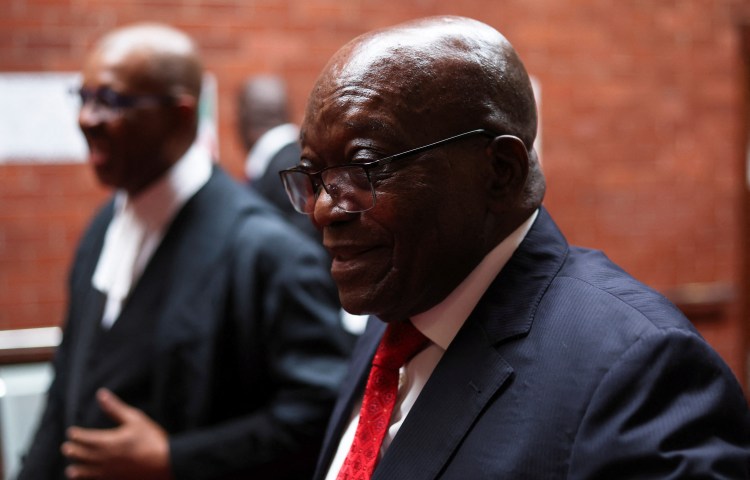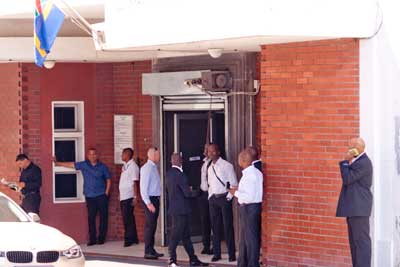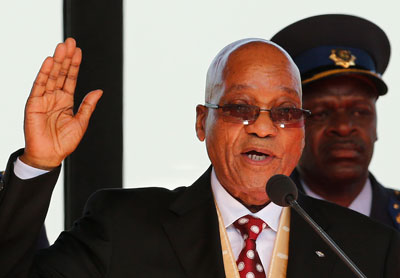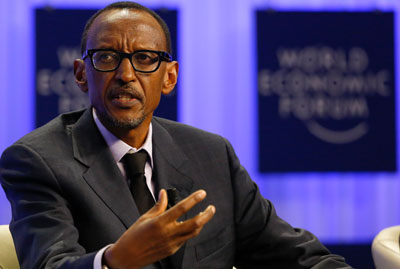
South African court prohibits former president’s private prosecution of journalist Karyn Maughan
New York, June 8, 2023—In response to the Wednesday, June 7, ruling by the Pietermaritzburg High Court prohibiting former South African President Jacob Zuma from continuing the private prosecution of journalist Karyn Maughan, the Committee to Protect Journalists issued the following statement urging the former president to accept the ruling: “The unanimous ruling of three…

South African journalist Sam Sole on landmark court victory: “2008 surveillance was the tip of the iceberg”
South Africa’s highest court, the Constitutional Court, handed down a landmark judgment on February 4 that not only protects journalists and their sources from surveillance abuse, but also upheld a lower court’s ruling that the insidious practice of the bulk interception of ordinary citizens’ data and communication is illegal. The ruling, documented by CPJ, was…

South African police repeatedly force journalists to delete photos
South Africa is synonymous with crime in the eyes of many–as evidenced by the recent mugging of a TV crew live on camera–but for the press, a more sinister threat to freedom lies in the growing number of cases where it is the police, in flagrant denial of their orders, who intimidate and threaten journalists,…

South Africa’s new communications ministry causes concern
Freedom of expression advocates in South Africa are concerned that the new Ministry of Communications, announced by President Jacob Zuma when he unveiled his cabinet on May 25, will compromise the independence of the public broadcaster and serve as a propaganda office.

Twitter war shines light on how Rwanda intimidates press
“@RFI speak straight up English, frenchie!! U crying? U started not to make sense,” was one taunting tweet from a certain prolific Twitter account belonging to “Richard Goldston.” The account, since deleted, belonging to a self-proclaimed “anti-imperialist,” repeatedly antagonized Radio France Internationale journalist Sonia Rolley for her critical coverage of the deaths of Rwandan government…
Pressure on Journalists Rises Along With Africa’s Prospects
After a decade of unprecedented growth and development, the insistence on positive news remains a significant threat to press freedom in sub-Saharan Africa. By Mohamed Keita A newspaper displayed in the Ikoyi district of Lagos on September 30, 2013, tells of a deadly attack on a college in northeast Nigeria by suspected Boko Haram militants.…
Mandela’s Legacy of Media Freedom Stands Its Ground
How robust are the institutional safeguards that underpin Nelson Mandela’s vision of a strong and independent South African media? By Sue Valentine Nelson Mandela, pictured in May 2011, sometimes accused critical black journalists of disloyalty during his presidency. (AFP/Elmond Jiyane)
Zuma should send secrecy bill for further review
New York, November 14, 2013–The Committee to Protect Journalists urges South African President Jacob Zuma not to sign the revised Protection of State Information Bill and instead to send it to the Constitutional Court for review. The bill, which was sent back to parliament in September, was passed again by the National Assembly late on…
CPJ urges President Zuma to block secrecy bill
Dear President Zuma: We are writing to express our concern about South Africa’s Protection of State Information Bill and join with civil society organizations in your country in urging you to send the bill back to the National Assembly for further revision when it comes to you for confirmation.

Worrying trends at South Africa’s public broadcaster
South Africa is in the midst of one of its most important political events–the ruling African National Congress’s Mangaung elective conference, which takes place once every five years to shape policy and elect new leadership. Because of the power of the ANC as South Africa’s leading political party, the conference holds not only the future…